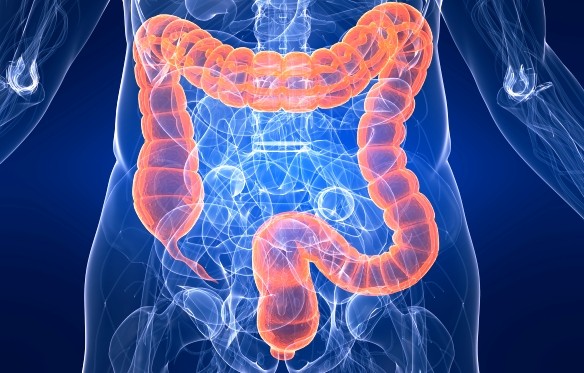Your small intestine and large intestine (colon) contain lots of bacteria. Common medical terms to describe this bacterial environment are gut microbiome or gut flora. This environment is a frontier in science and medicine, with new information coming out constantly.
It turns out your gut microbiome is more complicated and diverse than we knew, and it is affecting your health in far reaching ways. After reading the new research, my conclusion is that having a healthy population of gut bacteria is absolutely critical to your immune system.
Jobs of beneficial bacteria in your colon include:
- Fermenting carbohydrates, which produces short chain fatty acids. These fats and other metabolites of this process influence metabolism in our bodies in many important ways.
- Producing vitamins.
- Crowding out bad bacteria. If you do not have adequate beneficial bacteria, then lousy bacteria are able to increase and an imbalance is created called dysbiosis. Dysbiosis is associated with many GI diseases and is a risk factor for cancer.
Bad Gut Bacteria Cause Cancer
We have known for some time that certain species of bad gut bacteria are linked to cancer, such as Helicobacter pylori, which can cause gastric cancer. But now we know that common patterns of imbalance can lead to colon cancer. And because your gut microbiome works so closely with your immune system, dysbiosis may indirectly cause cancers in other organs in your body, such as liver, lung and pancreas.
How? Bad bacteria promote inflammation, and produce toxins and toxic metabolites of food. Inflammation impairs metabolism of hormones and nutrients, and interrupts the synthesis of vitamins. All of this impairs your immune system and increases your risk of cancer.
Your population of beneficial gut bacteria can be damaged from gut infections and medications to treat infections, such as antibiotics. Stress and poor diet also lead to dysbiosis. Once your microbiome is compromised, you are more prone to gut infections, setting up a vicious cycle.
Gut Bacteria Influence Your Response to Cancer Medicines!
Also in the news, if you do develop cancer, your gut microbiome may determine your response to chemotherapy, radiation and immunotherapy. Your gut bacteria can regulate chemotherapy induced inflammation and modify the structure of cancer drugs, which may activate or inactivate them. Scientists are reporting that whether or not patients respond to immunotherapy drugs, for example nivolumab (Opdivo); may depend on the population of bacteria in their gut. Science is trying to determine which bacteria species are enhanced in patients that have a better response to these drugs, so they can promote those bacteria before treatment. Lactobacillus and Bifidobacterium species are two of the beneficial bacteria that appear to be enhanced in responders.
Another recent clinical trial showed that taking an antibiotic, 2 months before or 1 month after, starting cancer immunotherapy significantly shortened the patients survival time. This was due to less durable response to the drugs. Now scientists are trying to reprogram patients microbiomes’ to enhance cancer treatment, with therapies such as fecal transplant. This procedure transfers beneficial bacteria from a healthy patient’s stool to another patient’s colon. Then immunotherapy is administered, with hopes that this will enhance response.
Things to do to protect and enhance your gut bacteria:
- Expand your diet – An important point about your gut microbiome, is that it is a dynamic system. It changes when you change your diet! At this point my recommendation would be to eat the widest variety of diet possible, staying within your food tolerances, which should keep your flora diverse.
- Eat fermented food – organic apple cider vinegar, sauerkraut, kim chee, kefir, or yogurt either from cow’s milk or a plant-based milk. Have at least one serving of a food from this list daily.
- Eat high fiber – beans, whole grains, fruits, vegetables.
- Take a probiotic – mixed strains of Lactobacillus and Bifidobacterium are best. There is risk to taking probiotics during chemotherapy, because you are immune compromised. If you are having chemo, check in with me before adding this to your supplement regimen.
- Have a stool panel. We have the ability to identify your gut bacteria. If you have dysbiosis, we can treat it and rebalance your flora. If you want a stool panel, come in for an office visit to discuss prices and get a stool kit.
This topic is so interesting and vast! I will keep watching the medical news for exciting information about your microbiome and keep you up to date.
References
- Integr Cancer Ther. 2019; 18: 1534735419876351.Published online 2019 Sep 13. doi: 1177/1534735419876351, Manipulating Gut Microbiota Composition to Enhance the Therapeutic Effect of Cancer Immunotherapy, Ming Yi, MD,1Dechao Jiao, MD, PhD,2 Shuang Qin, MD,1 Qian Chu, MD, PhD,1 Anping Li, MD,2 and Kongming Wu, MD, PhD1
- Nat Rev Cancer. 2013 Nov; 13(11): 800–812. Published online 2013 Oct 17. doi: 1038/nrc3610 The microbiome and cancer, Robert F. Schwabeand Christian Jobin

